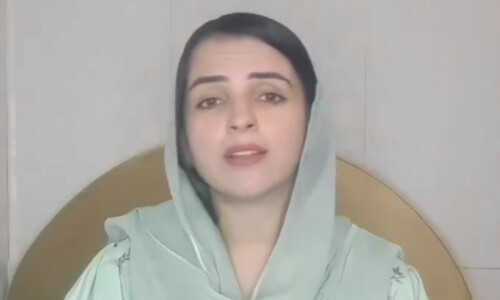WANA: Tribal elders of South Waziristan set a unique example on the World Polio Day observed on Friday by taking the vaccination drops themselves to persuade fellow tribesmen to get their children vaccinated and offset growing impact of propaganda against the anti-polio campaigns by certain quarters in their region.
The elders held a jirga to mark the day and a walk was held from the SWA Rest House to Bab-i-Waziristan where prayers were offered. The walk was attended by elders of Mehsud and Barki tribes, clerics, officials of the administration and health department and representatives of organisations associated with efforts to eradicate polio.
The elders asked the agency’s political agent Nawab Khan Safi to administer polio drops to them to show the world that “we want elimination of this crippling disease from our soil once for all”.
Know more:Fresh polio drive launched for tribal regions
The elders and officials said the Mehsud and Barki tribes had proved that they want to end the disease from their areas.
The tribal elders pledged to administer the drops to their kids and also help vaccinate other children around them.
Sharif on strategy: Meanwhile, speaking at a ceremony held in Islamabad in connection with the day, Prime Minister Nawaz Sharif said a comprehensive communication strategy was being prepared for promotion of immunisation of children against polio and other diseases as their right.
The prime minister administered polio vaccine to affected children and met their parents.
He said the strategy would call upon all segments of the society to ensure the children’s right to immunisation.
He said the government was committed to eradicating polio and all resources were being made available for the purpose.
He said the PM’s Office had recently launched a Polio Eradication Initiative for directly monitoring and reviewing progress on this matter of utmost importance.
The Prime Minister’s Focus Group for Polio Emergency has also been constituted to hold monthly meetings to assess the performance of the eradication programme.
The day was observed across the world to create awareness about the hazards of the crippling disease.
Speaking on the occasion, health officials said the polio eradication campaign could be made result-oriented with the support and guidance of religious scholars whose role was very important in creating awareness among people.
They said the government was focusing on protection of citizens from lethal diseases and solution of health problems.
Only Pakistan, Nigeria and Afghanistan still have transmission of the wild polio virus.
Since 1988, the number of polio cases in the world has been reduced by 99 per cent from 350,000 a year to about 400 in 2013.
This year Southeast Asia has been certified as polio-free.
Earlier this year, the director general of the World Health Organisation declared polio to be still a public health emergency of international concern.
The WHO urged polio-impacted countries to ensure that travellers leaving their borders were immunised against the disease.
There is no cure for polio, but for as little as about Rs60 worth of oral vaccine, a child can be protected from the disease for life.
Dr Elias Durry, who heads the WHO’s polio eradication efforts in Pakistan, said in a statement that of 220 cases reported in the country this year, most had been detected in the northwest, where the Taliban had fought to prevent immunisation, killing about 60 workers and police escorting polio teams across Pakistan.
He told The Associated Press that the government would launch a fresh anti-polio campaign in the northwest on Saturday to reach children who had missed out on previous efforts because of the militants.
Published in Dawn, October 25th , 2014














































